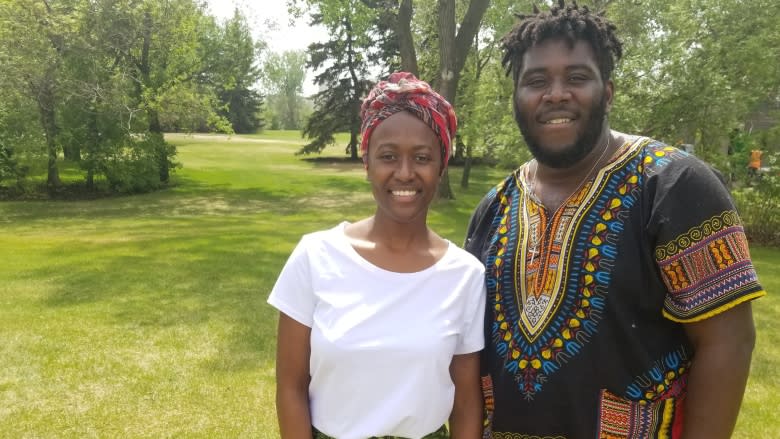'You feel you're not alone': African pavilion returns to Mosaic after population doubles since 2011
The African pavilion at Mosaic is returning after more than a decade, thanks to the African population in Saskatchewan doubling in recent years, allowing more people to volunteer.
In 2011, Statistics Canada reported more than 8,000 people of African origin were living in Saskatchewan. In 2016, the number had doubled to more than 16,000.
In some cases, representation from different countries tripled, including Nigeria and Eritrea.
"There's more of a variety in countries from Africa that are now in the city," Nyasha Mwela said.
Mwela is the junior ambassador for the Africa pavilion and originally from Zambia, Africa. She said the population adds to the different cultures in Regina.
Mwela said she thinks it's important to have the African pavilion, "especially for the younger African Canadians."
"It would be really good for them to actually come to the pavilion and see what it's all about because there's a huge difference between hearing your parents tell you stories about the pavilion and just tell you stories about have home versus actually experiencing the culture itself," she said.
"It's just going to a Rider game versus watching it on TV."
Romas Mwenge is managing the pavilion this year. He's also from Zambia and said Mosaic as a cultural event inspired him.
"Culture is a very strong part of people's lives. It influences their views, their values their humour, their hopes, their loyalties, and their worries and fears," Mwenge said.
"So when you're working with people and building relationships with them, it helps to have some perspective and understanding of their culture."
Mwenge said that many African countries will be represented at the pavilion, including: Zambia, Kenya, Ethiopia, Ghana and Morocco.
A challenge with the pavilion, Mwenge said, was people of different countries and cultures working together.
"I've never done something like this," he said.
"It has taken a lot of time for us to understand each other and then put on a huge event like this one."
Mwenge said there's differences between countries even how they prepare food.
"For instance, rice in Ghana and Nigeria, they prepare it differently but it's the same rice."
The growing African population in Saskatchewan is exciting, Mwenge said, because diversity is a good thing and most are bringing new skills, but it comes with challenges.
"We've got to learn and live with a different people that we've never known or lived with before — and that can be challenging, it can be uncomfortable," he said.
"Regardless of where they're coming from or how they look like, I need to talk to them so that I can have a good perspective and understanding."
He said he thinks most African people that are coming to Regina are French speaking. He said this will help build the French community in the province.
Originally stopped because there were not enough volunteers
Kiumbura Githinji, executive director of the African Canadian Resource Network, said the African pavilion ended because there weren't enough people to volunteer, as running it was a tough job.
"But now, with the increase in population, I guess we have more hands."
In the past, Githinji said he heard the African community was very small.
"[They were] very few and they almost knew each other. In their own admission over the last six seven years, the numbers have really changed and every corner you turn you at least see someone."
Githinji said this community is important.
"For many, you feel you're not alone, you feel you're many," he said.
"When people are more, there's a little bit more warmth as in you can share a little bit more in terms of culture and other resources that are common to that group or community."
Githinji doesn't know exactly why the population has increased but said it could be to a rising economy, professionals immigrating, and being bringing over family and friends.
The African Pavilion will be held at Carrefour des Plaines School on Hillsdale Street and will be open with Mosaic from May 31 to June 2.



